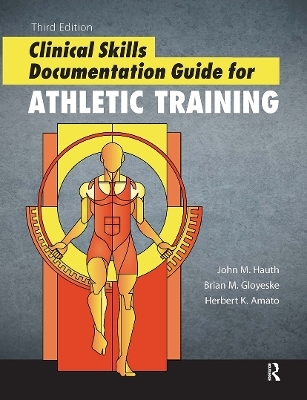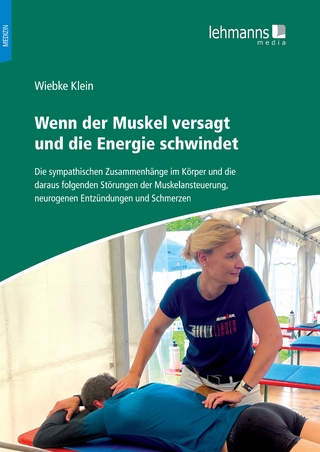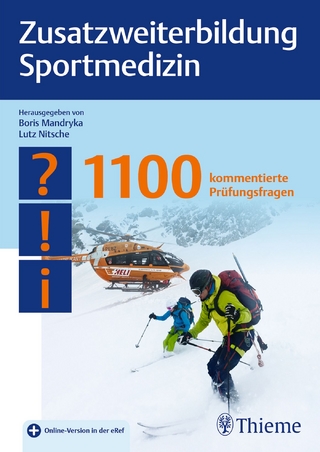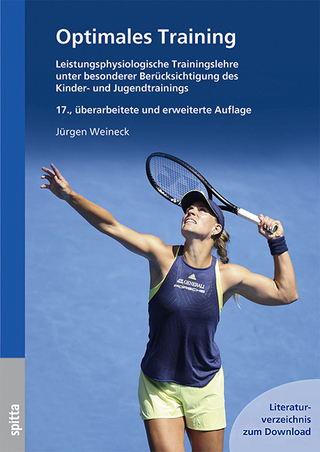
Clinical Skills Documentation Guide for Athletic Training
SLACK Incorporated (Verlag)
978-1-61711-619-3 (ISBN)
Clinical Skills Documentation Guide for Athletic Training, Third Edition includes a more user-friendly layout for the student. Organized by the Athletic Training Education Competencies, Fifth Edition and the associated content areas, this Third Edition allows for easier integration into the classroom, laboratory activities, and clinical assessment.
The organization of skills around Athletic Training Education Competencies, Fifth Edition, including crosswalk information from the latest BOC Role Delineation Study/Practice Analysis, Sixth Edition, aligns the skill sheets from Clinical Skills Documentation Guide for Athletic Training, Third Edition with commonly used texts and reference materials.
What is in the Third Edition:
A user-friendly layout organized by the Athletic Training Education Competencies, Fifth Edition and mapped by the BOC domains
New clinical skill assessment forms in the areas of acute care, prevention and health promotion, and therapeutic interventions
Includes references to specificity, sensitivity, and evidence-based practice guidelines where appropriate
The Program Assessment chapter provides faculty with an excellent resource for tracking mastery of skills and program outcome achievement
Instructor’s materials consist of online versions of the clinical integration proficiencies
Included with the text are online supplemental materials for faculty use in the classroom.
With an updated user-friendly layout and new clinical skill assessment forms, the Third Edition of Clinical Skills Documentation Guide for Athletic Training will be invaluable for students, faculty, clinical preceptors, and practicing athletic trainers who want to learn or enhance understanding and mastery of essential clinical skills.
John M. Hauth, EdD, LAT, ATC, is the Senior Director of Sports Medicine Relationships at St. Luke’s University Health Network in Bethlehem, Pennsylvania. Prior to his retirement from academe in January 2015, John held appointments as a tenured faculty member, program director, and associate dean at East Stroudsburg University of Pennsylvania. The University bestowed its highest faculty honor of Distinguished Professor in May 2010. He had been previously recognized for teaching excellence by the Pennsylvania Academy for the Profession of Teaching. He was inducted into the Pennsylvania Athletic Trainers Hall of Fame in 2009. He is an active member of the National Athletic Trainers’ Association, having been presented the Association’s Most Distinguished Athletic Trainer Award and Professional Development Excellence Award. John has more than 30 years of experience as an athletic trainer, having worked in nearly every professional setting. He is licensed to practice as an athletic trainer by the PA State Board of Medicine and has been nationally certified (BOC) since 1983. He served as the Head Athletic Trainer for NCAA Division II Football and Division I Wrestling Teams from 1985 to 1997. John continues to work clinically as the Director of Athletic Training and Sports Medicine for the Lehigh Valley Steelhawks of the Professional Indoor Football League and at special events across the Lehigh Valley. In 2010, John served as a member of the Sports Medicine Staff for the XXI Central American and Caribbean Games in Mayaguez, Puerto Rico. John resides in East Stroudsburg, Pennsylvania, with his wife, Lynn. They have three children: daughter Amanda and sons Kendall and Connor. Brian M. Gloyeske, MS, LAT, ATC, is currently serving as an athletic trainer for St. Luke’s University Health Network. He has practiced as a NATA BOC athletic trainer since 2010. Originally from Jackson Center, Ohio, Brian earned a Bachelor of Science in athletic training from the University of Toledo in 2010. He earned a Master of Science in athletic training from East Stroudsburg University of Pennsylvania in 2011, during which time he served as a graduate assistant athletic trainer at Warren Hills Regional High School, Washington, New Jersey. Before joining St. Luke’s full time in 2015, he spent 4 years as an instructor in a CAATE-accredited athletic training program at East Stroudsburg University of Pennsylvania. During his time at East Stroudsburg University, he worked clinically with collegiate dancers and the general population of the University and oversaw and provided athletic training services to the East Stroudsburg Youth Association Athletics. In addition, Brian served as the head athletic trainer for the Lehigh Valley Steelhawks of the Professional Indoor Football League. Currently, Brian serves as an assistant athletic trainer for Moravian College in Bethlehem, Pennsylvania, and coordinates the secondary school concussion education program for St. Luke’s University Health Network. Herbert K. Amato, DA, ATC, is currently an Associate Vice Provost at James Madison University (JMU) in Harrisonburg, Virginia. He was the Athletic Training Program Director at JMU from 1988 to 2006 and is still a tenured professor in the Department of Health Sciences. He has been actively involved in the education of athletic training students for 36 years at the university and high school levels. Dr. Amato has an extensive public speaking and consulting background and has published several articles in the areas of athletic training education and clinical practice. He was inducted into the Virginian Athletic Trainers’ Hall of Fame in 2012. He is an active member of the National Athletic Trainers’ Association, and has been presented the Association’s 2003 Sayers “Bud” Miller Distinguished Educator Award. Dr. Amato was the lead author for the first two editions of this book; however, he believes the now-lead authors are able to better portray the current needs of the profession. As co-founder of ACES, a preparatory workshop company that helps prepare students to take the BOC exam, Dr. Amato has stayed current in the field by developing assessment exams that mimic the blueprint of the national exam. In his current position, he is the chair of the Assessment Advisory Council and was the co-chair of the University-wide 10-year reaffirmation for The Southern Association of Colleges and Schools Commission on Colleges. This commission is the regional accreditor for JMU. Dr. Amato is also active in service at the community, university, and national levels. He resides in Harrisonburg, Virginia, with his wife, Lori. They have three grown daughters, Casey, Lyndy, and Jessy.
Dedication Acknowledgments About the AuthorsIntroduction Section I Introduction Chapter 1 Certification of Athletic Trainers and the Evolution of Psychomotor Skill Assessment Chapter 2 How to Use This Book Section II Prevention and Health Promotion Chapter 3 Prevention and Health Promotion Section III Clinical Examination and Diagnosis Chapter 4 Musculoskeletal System—Region 1: Foot and Toes Chapter 5 Musculoskeletal System—Region 2: Ankle and Lower Leg Chapter 6 Musculoskeletal System—Region 3: Knee Chapter 7 Musculoskeletal System—Region 4: Hip and Pelvis Chapter 8 Musculoskeletal System—Region 5: Lumbar and Thoracic Spine Chapter 9 Musculoskeletal System—Region 6: Cervical Spine Chapter 10 Musculoskeletal System—Region 7: Shoulder Chapter 11 Musculoskeletal System—Region 8: Elbow Chapter 12 Musculoskeletal System—Region 9: Wrist and Hand Chapter 13 Musculoskeletal System—Region 10: Head and Face Section IV Acute Care of Injuries and Illnesses Chapter 14 Acute Care of Injuries and Illnesses Section V Therapeutic Interventions Chapter 15 Therapeutic InterventionsAppendix Self-Reporting Assessment of Athletic Training CompetenciesBibliographyFinancial Disclosures
| Erscheinungsdatum | 02.04.2016 |
|---|---|
| Sprache | englisch |
| Maße | 216 x 279 mm |
| Gewicht | 1560 g |
| Themenwelt | Sachbuch/Ratgeber ► Sport |
| Medizin / Pharmazie ► Medizinische Fachgebiete ► Sportmedizin | |
| ISBN-10 | 1-61711-619-X / 161711619X |
| ISBN-13 | 978-1-61711-619-3 / 9781617116193 |
| Zustand | Neuware |
| Haben Sie eine Frage zum Produkt? |
aus dem Bereich


